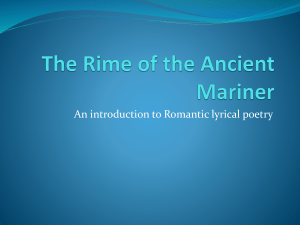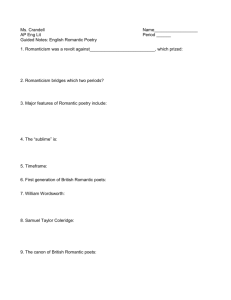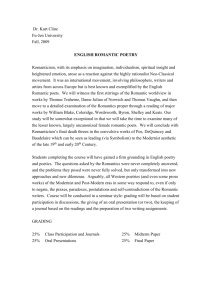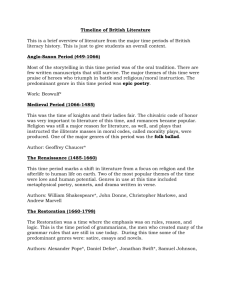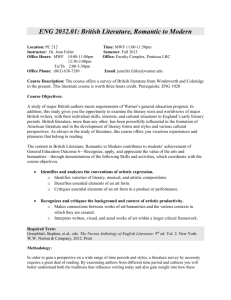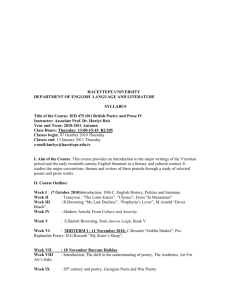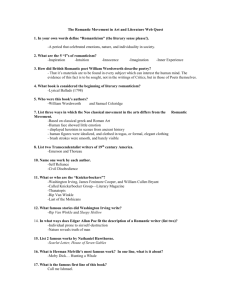Survey of British Literature II: Restoration to Romanticism
advertisement
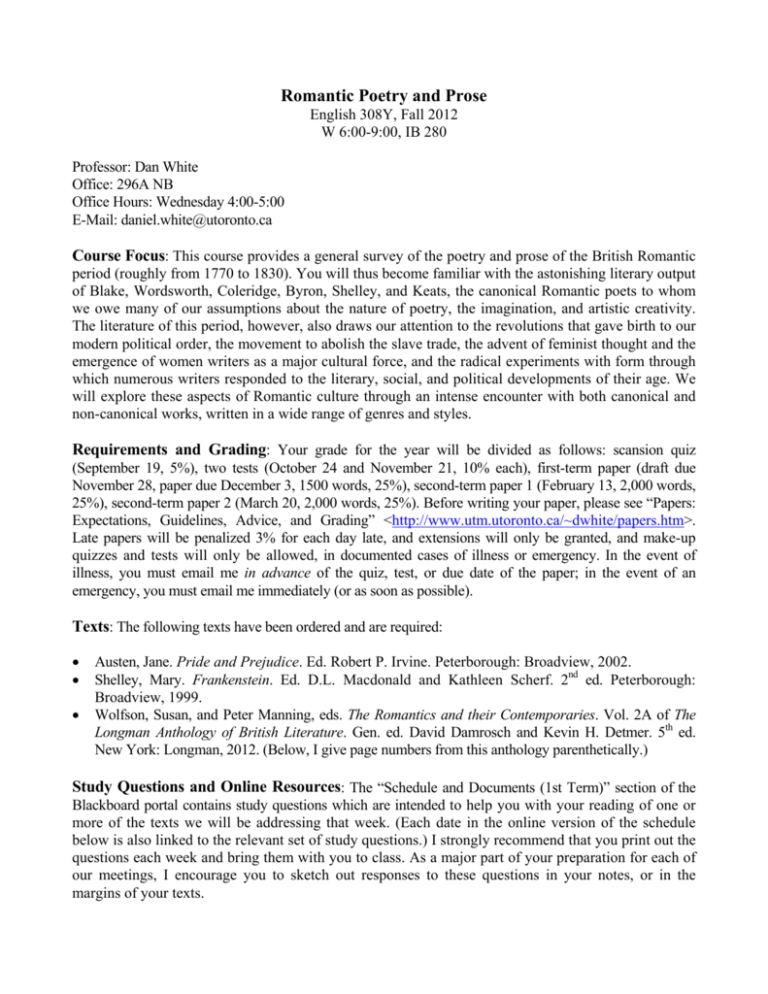
Romantic Poetry and Prose English 308Y, Fall 2012 W 6:00-9:00, IB 280 Professor: Dan White Office: 296A NB Office Hours: Wednesday 4:00-5:00 E-Mail: daniel.white@utoronto.ca Course Focus: This course provides a general survey of the poetry and prose of the British Romantic period (roughly from 1770 to 1830). You will thus become familiar with the astonishing literary output of Blake, Wordsworth, Coleridge, Byron, Shelley, and Keats, the canonical Romantic poets to whom we owe many of our assumptions about the nature of poetry, the imagination, and artistic creativity. The literature of this period, however, also draws our attention to the revolutions that gave birth to our modern political order, the movement to abolish the slave trade, the advent of feminist thought and the emergence of women writers as a major cultural force, and the radical experiments with form through which numerous writers responded to the literary, social, and political developments of their age. We will explore these aspects of Romantic culture through an intense encounter with both canonical and non-canonical works, written in a wide range of genres and styles. Requirements and Grading: Your grade for the year will be divided as follows: scansion quiz (September 19, 5%), two tests (October 24 and November 21, 10% each), first-term paper (draft due November 28, paper due December 3, 1500 words, 25%), second-term paper 1 (February 13, 2,000 words, 25%), second-term paper 2 (March 20, 2,000 words, 25%). Before writing your paper, please see “Papers: Expectations, Guidelines, Advice, and Grading” <http://www.utm.utoronto.ca/~dwhite/papers.htm>. Late papers will be penalized 3% for each day late, and extensions will only be granted, and make-up quizzes and tests will only be allowed, in documented cases of illness or emergency. In the event of illness, you must email me in advance of the quiz, test, or due date of the paper; in the event of an emergency, you must email me immediately (or as soon as possible). Texts: The following texts have been ordered and are required: • • • Austen, Jane. Pride and Prejudice. Ed. Robert P. Irvine. Peterborough: Broadview, 2002. Shelley, Mary. Frankenstein. Ed. D.L. Macdonald and Kathleen Scherf. 2nd ed. Peterborough: Broadview, 1999. Wolfson, Susan, and Peter Manning, eds. The Romantics and their Contemporaries. Vol. 2A of The Longman Anthology of British Literature. Gen. ed. David Damrosch and Kevin H. Detmer. 5th ed. New York: Longman, 2012. (Below, I give page numbers from this anthology parenthetically.) Study Questions and Online Resources: The “Schedule and Documents (1st Term)” section of the Blackboard portal contains study questions which are intended to help you with your reading of one or more of the texts we will be addressing that week. (Each date in the online version of the schedule below is also linked to the relevant set of study questions.) I strongly recommend that you print out the questions each week and bring them with you to class. As a major part of your preparation for each of our meetings, I encourage you to sketch out responses to these questions in your notes, or in the margins of your texts. To access some of the following resources from off-campus computers, you will need to log in using your UTORid and password: • • • • • • • • Oxford English Dictionary (“OED”) online Alan Liu’s “The Voice of the Shuttle: Web Page for Humanities Research” (“Romantics”) Jack Lynch’s “Literary Resources Page” (“Romantic”) Laura Mandell and Alan Liu’s Romantic Chronology The William Blake Archive. Ed. Morris Eaves, Robert N. Essick, and Joseph Viscomi. Lyrical Ballads: An Electronic Scholarly Edition. Ed. Bruce Graver and Ron Tetreault. Literature Online (LION). Chadwyck-Healey. Huge databases of poetry, prose, and drama in English. Representative Poetry Online. Ed. Ian Lancashire. (Contains “A Glossary of Poetic Terms in English Poetry” and “A Time-line of English Poetry 858-1998.”) Academic Integrity: Most of you would never dream of plagiarizing, but unfortunately far too many students at U of T do commit this serious academic offense. Each term since I arrived here in 2001, I have encountered at least one or two cases of plagiarism. I take this offense very seriously, and in each and every case meaningful sanctions have been imposed. Please review the following site: <http://www.writing.utoronto.ca/advice/using-sources/how-not-to-plagiarize>. And for a definition of plagiarism and a description of the procedure to be followed in the event that I suspect an instance of this offense, please see Section B of the “University of Toronto Code of Behaviour on Academic Matters”: <http://www.governingcouncil.utoronto.ca/policies/behaveac.htm>. E-Culture Policy: If you need to make me aware of an illness or emergency, please email me, but I will not be able to reply to most other emails. Should you have logistical questions about the course which are not answered on the syllabus or elsewhere, before emailing me please check with other students to see if the information you seek has been provided in a class which you missed. Because I will be using Blackboard to communicate with you from time to time, please make sure that emails sent via Blackboard will reach the email address you actually use. If you do not use your utoronto email account, in other words, please make sure to go into that account and set it to forward to the account that you do use. Drop Policy: The last date to withdraw from this course without academic penalty will be February 17, 2013. By that date, the quiz, the two first-term tests, and the first-term paper will have been marked and returned. Robert Gillespie Academic Skills Centre: The Academic Skills Centre (Hazel McCallion Academic Learning Centre, Room 390, <http://www.utm.utoronto.ca/asc/>, 905-828-3858) offers a range of workshops, seminars, and individual consultations. Section I. Introduction, Enlightenment WEEK 1, SEPTEMBER 12 Introduction; Literary periods and genres Reading poetry: Paul Fussell, from Poetic Meter and Poetic Form (handout / Portal), and Samuel Taylor Coleridge, “Metrical Feet: Lesson for a Boy” (handout / Portal) WEEK 2, SEPTEMBER 19 Scansion review and quiz John Locke, from An Essay Concerning Human Understanding (Portal) Edmund Burke, from A Philosophical Enquiry into the Origin of Our Ideas of the Sublime and Beautiful (37-43) William Gilpin, from Three Essays on Picturesque Beauty, on Picturesque Travel, and on Sketching Landscape (47-52) Section II. Early Romanticism: Sensibility, Abolitionism, and the French Revolution Debate WEEK 3, SEPTEMBER 26 Helen Maria Williams, “To Sensibility” (Portal) William Cowper, from The Task (Portal) Charlotte Smith, from Elegiac Sonnets and Other Poems: “Written in the church-yard at Middleton in Sussex” (89) Anna Barbauld, “A Summer Evening’s Meditation” (Portal) WEEK 4, OCTOBER 3 “The French Revolution and Its Reverberations” (14-19) From The Mansfield Judgment (Portal) Olaudah Equiano, from The Interesting Narrative of the Life of Olaudah Equiano, or Gustavus Vassa, the African (230-39) John Newton, “Amazing Grace” (251) Cowper, “The Negro’s Complaint” (258-59) Burke, from Reflections on the Revolution in France (113-22) Mary Wollstonecraft, from A Vindication of the Rights of Men, in a Letter to the Right Honourable Edmund Burke; Occasioned by his Reflections on the Revolution in France (122-30) Thomas Paine, from The Rights of Man: Being an Answer to Mr. Burke’s attack on the French Revolution (131-38) Hannah More, Village Politics: Addressed to all the Mechanics, Journeymen and Day Labourers, in Great Britain, By WILL CHIP, A Country Carpenter (152-60) Section III. The Author & Printer W Blake WEEK 5, OCTOBER 10 William Blake, from Songs of Innocence: “Introduction” (178), “The Shepherd” (178), “The Little Black Boy” (180-81), “The Chimney Sweeper” (181-82), “HOLY THURSDAY” (184), “Infant Joy” (185); from Songs of Experience: “Introduction” (189), “The CLOD & the PEBBLE” (190), “HOLY THURSDAY” (190-91), “THE Chimney Sweeper” (194), “The SICK ROSE” (194), “The Tyger” (197-98), “The GARDEN of LOVE” (198), “LONDON” (199), “INFANT SORROW” (200) WEEK 6, OCTOBER 17 Blake, The Marriage of Heaven and Hell (203-16) WEEK 7, OCTOBER 24 Test Section IV. “Poems ... materially different”: Wordsworth and Coleridge WEEK 8, OCTOBER 31 William Wordsworth, from Lyrical Ballads: “Preface” to the Second Edition (433-45), “Simon Lee, The Old Huntsman, with an incident in which he was concerned” (412-15), “Anecdote for Fathers, shewing how the art of lying may be taught” (415-16), “We are seven” (416-18), “Strange fits of passion I have known” (446-47), “Song (‘She dwelt among th’untrodden ways’)” (447-48), “‘A slumber did my spirit seal’” (448) Samuel Taylor Coleridge, from Biographia Literaria or, Biographical Sketches of My Literary Life and Opinions, from Chapter 14 (689-92) Francis Jeffrey, on “the new poetry” (468-71) WEEK 9, NOVEMBER 7 Wordsworth, from The Prelude, or Growth of a Poet’s Mind: “Book First. Introduction, Childhood, and School Time” (477-92), “Spots of Time” from “Book Eleventh. Imagination, How Impaired and Restored” (531-34); from Lyrical Ballads: “Lines written a few miles above Tintern Abbey, On Revisiting the Banks of the Wye during a Tour, July 13, 1798” (429-33) WEEK 10, NOVEMBER 14 Coleridge, from Biographia Literaria or, Biographical Sketches of My Literary Life and Opinions, from Chapter 13 (686-89), “The Eolian Harp” (626-28), “Frost at Midnight” (630-31), “The Rime of the Ancient Mariner” (634-49) WEEK 11, NOVEMBER 21 Test WEEK 12, NOVEMBER 28 Review “Papers” site: <http://www.utm.utoronto.ca/~dwhite/papers.htm> Workshop draft of first-term paper: TWO COPIES of 1500 word draft required MONDAY, DECEMBER 3, 12:00 P.M., FIRST-TERM PAPER DUE (1500 WORDS)
